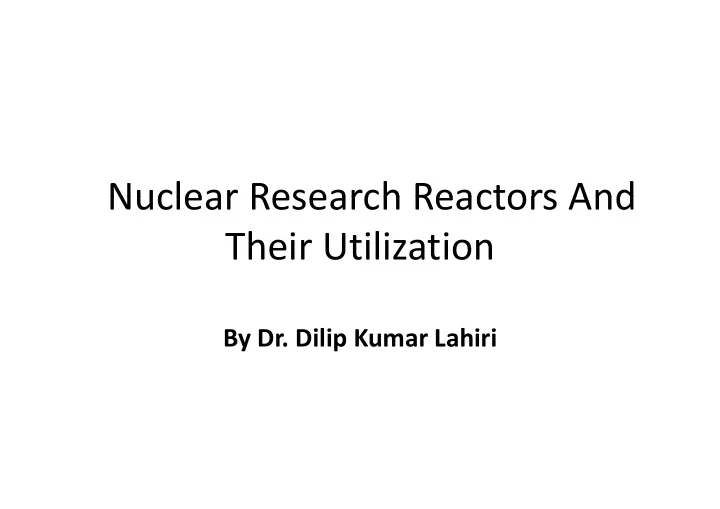

Nuclear Research Reactors And Nuclear Research Reactors And Their Utilization Their Utilization By Dr. Dilip Kumar Lahiri
Introduction Introduction Sub Atomic Particles a) Electrons ) b) Protons b) Protons c) Neutrons c) Neutrons
Structure of an Atom Structure of an Atom
Binding Energy Binding Energy It is the energy that would be required to disassemble the nucleus of an atom
Nuclear Fission Nuclear Fission
Nuclear Fusion Nuclear Fusion Fission is the division of one atom into two, and Fusion is the combination of two lighter atoms into g a larger one a larger one
Fusion inside the Sun Fusion inside the Sun
Typical Fusion Reaction Typical Fusion Reaction
Sustainable Chain Reaction https://www.youtube.com/watch?v=0Tgtv1CAfxI
Schematic Diagram of Nuclear Reactor
Nuclear Reactors can be broadly di id d i t t divided into two groups A) Power Reactors A) Power Reactors A) R A) Research Reactors h R
Difference between Power Reactors and Research Reactors Research reactors are nuclear reactors that serve primarily as a neutron source. They are also t Th l called non ‐ power reactors , in called non power reactors , in contrast to power reactors that are used for electricity production, heat generation or maritime propulsion generation, or maritime propulsion.
Layout of Thermal Power Plant Layout of Thermal Power Plant
Layout of Nuclear Power Plant Layout of Nuclear Power Plant
Research Reactors in India
Apsara Reactor Apsara Reactor
Apsara Reactor Apsara Reactor
Research Reactors Research Reactors
Dhruva Reactor Dhruva Reactor
Dhruva Reactor Top View Dhruva Reactor ‐ Top View
Some Research Reactors in the h h W World ld
Kyoto University Research Reactor Kyoto University Research Reactor Japan
Facilities in Kyoto Reactor Facilities in Kyoto Reactor
Open Pool Australian Light Water Reactor
Facilities Available in Dhruva Facilities Available in Dhruva A)Neutron Scattering Experiments B)Isotope Production Facilities C)In pile Irradiation Facilities D)Neutron Activation Facilities )
What is Neutron Scattering ? h ?
Scattering is used to determine the positions and motions of atoms in condensed matter
B d C Body Centre Cubic Structure t C bi St t
Isotope Production Facilities
In Dhruva Reactor Isotopes are produced through in Pile Irradiation Facilities
Irradiations are classified into three main types A) Long Term Irradiations B) Medium Term Irradiations ) C) Short Term Irradiaons C) Short Term Irradiaons
Long Term Irradiations Long Term Irradiations The Samples are irradiated for several years l Examples are Cobalt and Irridium Examples are Cobalt and Irridium
Medium Term Irradiations Medium Term Irradiations In Dhruva these are mainly In Dhruva these are mainly produced for Medical diagnosis produced for Medical diagnosis and Treatment and mostly irradiated for three to four days Examples are Molybdenum based samples which have reasonably l hi h h bl short life short life
Short Term Irradiation Facilities Short Term Irradiation Facilities A) Self Serve Facility A) Self Serve Facility B) P B) Pneumatic Carrier Facility ti C i F ilit
Pneumatic Carrier Facility Pneumatic Carrier Facility Small Capsules carrying Samples are conveyed Pneumatically into d P i ll i the Reactor from a sending the Reactor from a sending station located far away from station located far away from the Reactor. the Reactor.
THANK YOU THANK YOU
Recommend
More recommend